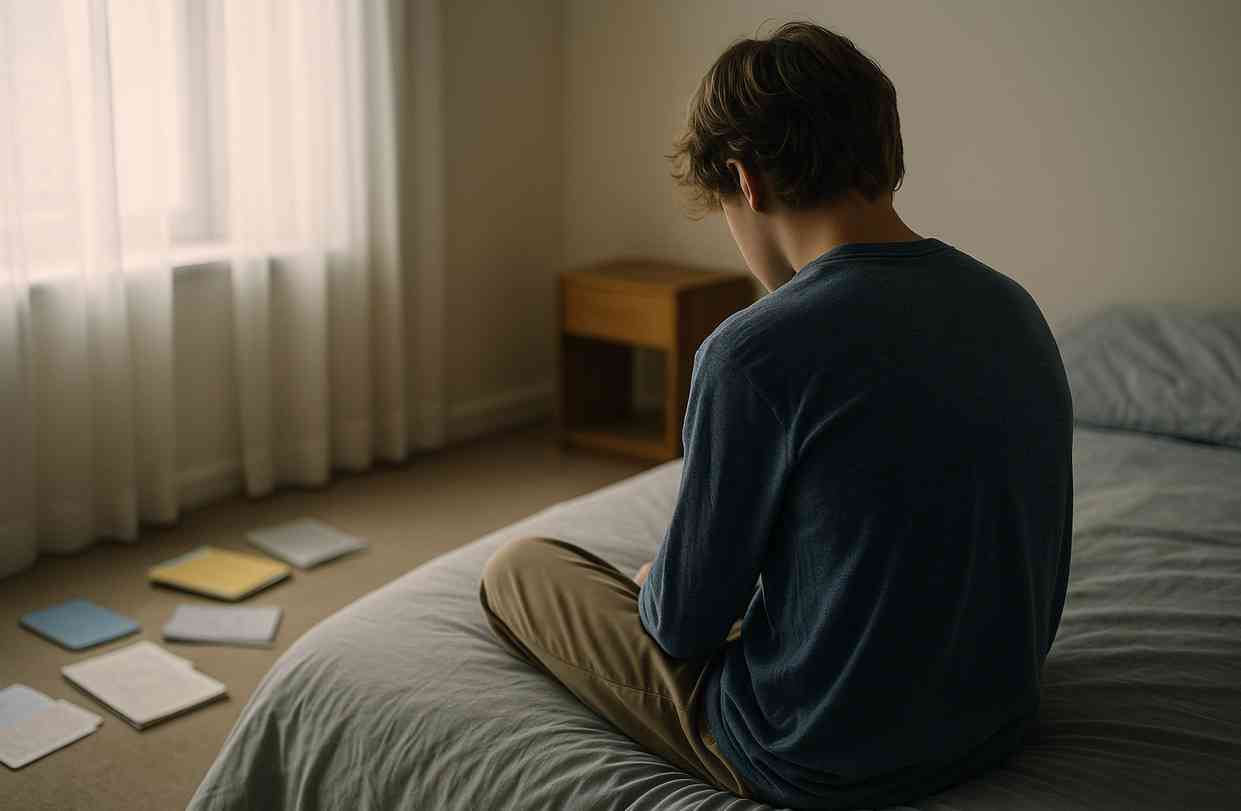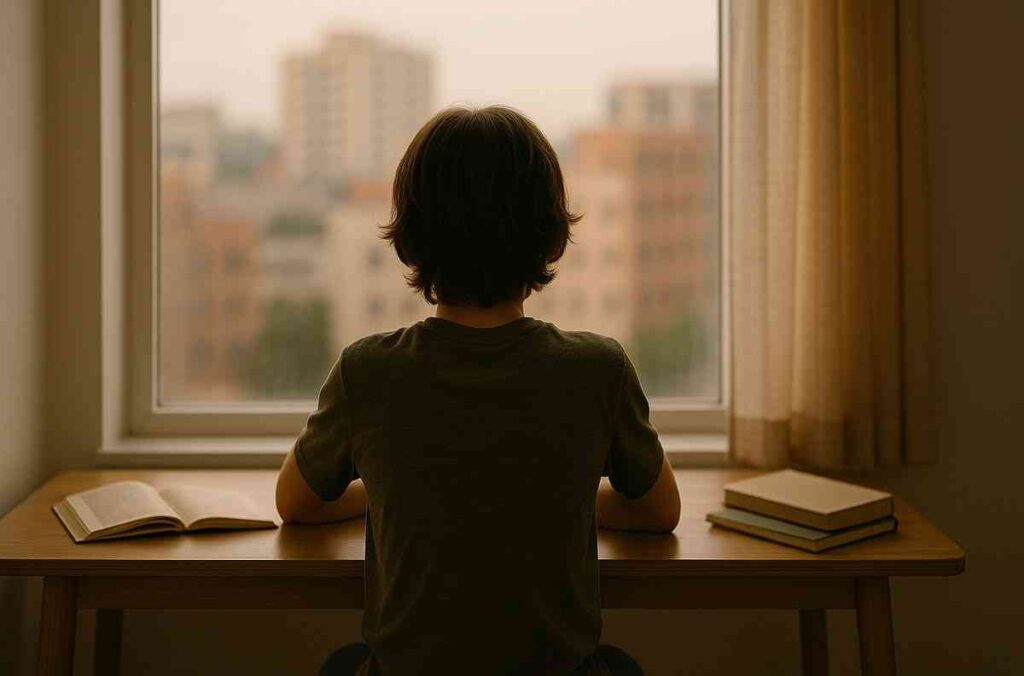Science
The Monk Who Saw the Future: Did an 11th-Century Benedictine Beat Astronomers?
17 February 2026

“Uncertainty — like fear — is an inseparable part of life. These feelings are normal and natural in every human life. As we develop, including in adulthood, we will experience different fears. We cannot get rid of them; we can’t uproot them. But we can learn to make those fears smaller, to tame them, to rationalize them,” family educator and counselor Dr. Marta Majorczyk tells us. She explains how to handle this in practice — especially when it comes to the fear of adulthood.
Anna Bobrowiecka: What is the nature of children’s and teenagers’ fear of adulthood, and where does it come from?
*Marta Majorczyk, Ph.D.: Fear of adulthood is, above all, fear of duties and tasks — but also of the rights that come with adult life. It’s anxiety tied to the vision of important functions, social roles, and developmental tasks. Adulthood means not only great freedom, but also a certain emotional maturity and the ability to take responsibility for one’s actions.
In psychology, fear related to these aspects of adult life is associated with the so-called Peter Pan syndrome. This term describes people who refuse to truly, concretely enter adulthood — they want to avoid agency and consequences, remaining eternal children.
The cause of this syndrome is usually very low self-esteem and a lack of self-belief. Ultimately, this fear largely comes down to what awaits us in the future — to the prospect of failures and setbacks. Today, social media significantly fuels such symptoms among young people. It often presents an unrealistic, idealized image of life — work, success, appearance, everyday routines, or parenting.
You might like to read: Education Needs to Move Beyond Rankings. A Critical Look at PISA, PIRLS and TIMSS Tests
A.B.: How common is the fear of adulthood among children and teenagers? One gets the sense they often have an idealized, unrealistic picture of adulthood. They’re happy that they’ll finally be free and able to live “their own way.”
M.M.: From my observations and experience as a psychologist, fear of adulthood mainly concerns older teenagers. Younger children, still in elementary or high school and just entering puberty, generally don’t think in such terms yet — they don’t understand what adulthood is. As you said, they often very much want to “already be adults,” or rather to possess all the rights and freedoms of an adult. They don’t yet understand that a variety of obligations, tasks, and consequences come with that. At this stage of a child’s development, fear of adult life hardly appears at all.
It tends to arrive later, along with the approaching prospect of turning eighteen. Teenagers realize that their lives have already changed since early childhood. They can compare and notice differences — how their school activities and obligations used to look versus how they are now. They start to see that people change and to think more realistically about the future. The older they get, the more of that future they can perceive — they think in terms of 5, 10, or even 15 years ahead.
With eighth-graders I recently taught at a school, I asked them in May: “What will you be doing in 5 years?” Believe me, they didn’t grasp the category of 5 years. At that stage, the word “future” tends to mean what they’ll do in a week, two weeks, or at most in a year. They answered: “In a year I’ll be at a different school,” “I’ll keep studying,” or “I’ll move.” At that time in life, adulthood is too distant to imagine. Only when we truly enter adolescence — when we build identity and plans, when we think practically and realistically about a career path — can fear appear.
We’re afraid of entirely new situations and changes. Uncertainty sets in. Notice: in elementary or high school, everything is arranged for us. We don’t have to handle or monitor things ourselves, because a certain order is given to us, imposed. After high-school graduation, when we start college or university, we get a first lesson in adult life, where everything depends on us. No one leads us by the hand anymore; everything can change; everything is fluid — and becomes what we take care to make it. Maybe we need to move. Maybe we need to start working and combine that with studies. These are big changes in a young person’s life that can generate anxiety.

A.B.: How can a young person learn to cope with this fear?
M.M.: First, it’s worth keeping some distance from what we see on social media. It’s full of unrealistic visions of success that shouldn’t be compared to our real lives. Seeing that someone achieved great success can intensify, in a person with low self-esteem, the conviction: “I’m not enough, I’m not good enough, I couldn’t do that.” Such a person begins to fear that they have no chance of fulfilling their dreams but are at risk of failure — so they start to withdraw and give up on growth.
One way to cope with fear is to practice mindfulness — focusing on the here and now and appreciating what we have. It’s worth expressing gratitude for the good things that happen to us and concentrating on positives. Remember, too, that we can control what we genuinely influence. No one can arrange everything in life exactly as they wish. We must learn to let go. In theory this is obvious, but even adults often take a long time to learn it.
Another crucial skill is planning and taking small steps. Instead of creating a grand, ambitious life plan for the next 10–15 years, it’s better to start keeping a planner or calendar in which we write down only what we want to do on a given day, week, or month. We can seek longer-term help from a good development coach or psychologist, but for such a plan to crystallize and succeed, we need to know ourselves well — to know what matters to us, what our values are, where we’re heading, and what we want in life.
Something that may sound banal but is very important is maintaining a healthy lifestyle. Without physical activity and caring for our health and well-being, we’re not able to fight fear.
Finally, it’s very important to simply accept states of uncertainty. Uncertainty — like fear — is an inseparable part of life. These are normal, natural feelings in every human life. As we develop, including in adulthood, we will experience different fears. We cannot get rid of them; we can’t uproot them. We can, however, learn to make those fears smaller, to tame them, to rationalize them, and — despite them — to act slowly and calmly. Sometimes, with deeper anxiety states, psychotherapy and pharmacotherapy are necessary.
Worth reading: “It’s Not Hormones.” Expert Debunks the Biggest Myth About Teen Rebellion
A.B.: How do fears carried over from childhood affect later, adult life? Will such a person struggle to become independent at all?
M.M.: Much depends on what happens when a child experiences fear. Do they receive proper support? If so, there is a good chance that a young person will be able to work through those fears — which later becomes an asset. If, however, adults — caregivers, parents, teachers — reinforce the fear through improper educational and parenting practices, those fears will strengthen, and unfortunately new ones will accumulate. They will merge with one another.
Then we have a straight path to an emotional disorder, for example in the form of a phobia or generalized anxiety. A teenager who, at such an early stage of development, has a diagnosed anxiety disorder will not manage adulthood well. It will be an additional, serious burden in their life — one they can’t handle alone and one that won’t simply pass. The situation can vary greatly and depends, to a large extent, on how our childhood unfolded: whether we received adult support and whether there were no abuses or violations on their part.
A.B.: What then?
M.M.: In that case, the state can be compared to keeping a proverbial “skeleton in the closet.” That “skeleton” is our fear, and the closet is our subconscious — a part of the psyche where we store content that influences our feelings, thoughts, and behaviors. Day to day, the skeleton is hidden deep, shut in the closet. We feel the weight, yet somehow keep moving forward. But at some point that “weight” falls out. One day we’ll open the closet by accident — or someone else will, or some event will. And then it’s hard to regain control, to put it back and mask it.
Usually, at that point, a greater, longer psychological crisis occurs. Parenting is a perfect example. Will a woman with low self-esteem and constant fears see herself as a good mother? Can she give a child what she herself lacks? Such a mental state in a woman who becomes a mother is one of the most common causes of the so-called baby blues — postpartum depression.
And in the age of social media, which can present parenting and motherhood as an idyll, it’s easy for such a woman to experience drama and total collapse. So it’s very important to try to take care of ourselves as early as possible, to understand ourselves — and to learn to ask for support, even as we face the fear of adulthood.
* Marta Majorczyk, Ph.D. — educator, family counselor, neuropsychologist, psychotherapist, and ODN trainer; researcher and longtime university lecturer who blends coaching, tutoring, and mentoring in practice. She focuses on family functioning (roles and life-cycle dynamics), education and upbringing, developmental care, and early-childhood care systems, with a special interest in values and ethics in the work of educators and psychologists. A regular contributor to professional journals, including Wczesna Edukacja, Dyrektor Szkoły, Sygnały. Miesięcznik Wychowawcy, Bliżej Przedszkola, and Newsweek Psychologia.
Explore the full conversation: Młodzi w strachu przed dorosłością. Dlaczego tak bardzo boją się żyć?
Science
17 February 2026



Zmień tryb na ciemny